When it comes to the most memorable part of the wedding day, lots of couples single out the wedding ceremony as one of their absolute highlights. But it’s not always the easiest path to the altar! Planning your wedding ceremony can raise lots of (let’s be honest) head-wrecking questions that can take several hours of Googling to unravel. There is a lot involved and trying to get your head around it all can leave you feeling frazzled. We’ve seen the same questions rear their head again and again from how much notice do I need to give (and what actually is it in the first place) to what documents do I need for a Catholic wedding. So to make life a little bit easier, we’ve rounded up 16 of the most popular wedding ceremony questions and we’ve got all the info you’ll need below in one handy document so you can pop back to it if and when you need to – might be best to grab a cuppa first though, this is a long one!
1. Where do I start?
We have a really helpful guide to three of the most popular ceremonies styles with all your legal and ceremony requirements. You can find it here:
https://www.weddingsonline.ie/planning/your-weddin...
- One of the main things to remember is that there’s a legal requirement regardless of the type of wedding ceremony you opt for that you must give at least three months’ notice to the state of your intention to marry. You’ll find lots more information in the below Q&A’s.
- You will also need to give plenty of notice to the organisation who will be officiating your ceremony whether it’s a church, civil or humanist ceremony so that they can pencil in your date and you can arrange a celebrant. With the likes of Catholic wedding ceremonies, you will need to get your hands on several documents as well, which can take a while. And Civil ceremonies and Humanist ceremonies are on the rise which means you’ll need plenty of time to make sure you secure your ideal date and chosen venue (and get the venue approved if you’re going the civil ceremony route).
We’re also going to go through some of the most popular ceremony questions below. If you have any other questions, please feel free to leave a comment below and we’ll try and get to the bottom of it for you!
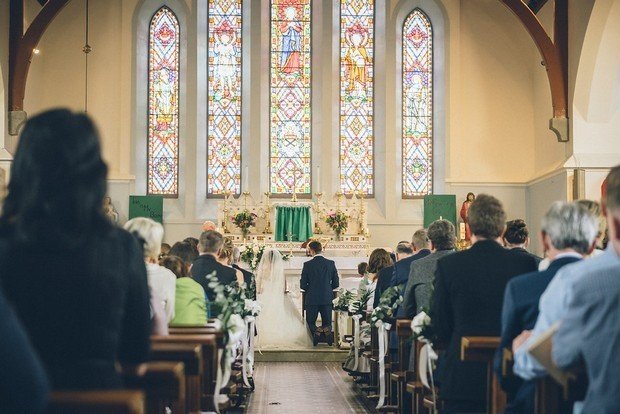
2. What types of ceremony options are available in Ireland?
Religious: A religious wedding ceremony takes places in a church and is legally binding. The ceremony is presided over by a priest or pastor depending on your specific faith and will have references to God. A spiritual wedding ceremony is another option that does not have to take place in a church - it is a non-denominational ceremony, and again is legally binding. Although spiritualism is a religion in its own right, it does not have any particular God similar to other religions. Spiritualists believe that your wedding day is about you and your partner and should reflect this - you can get married with the words, vows and music of your choice. One difference between Humanist and Spiritualist weddings is that there can be religious references. It’s also an option for couples from two different religions.
Interfaith Ceremonies: Interfaith fosters spiritual inclusiveness and serves people of all faiths or none. Ceremonies are legally binding and are celebrated by ordained non-denominational Ministers. You have complete freedom and flexibility to choose your content and make the ceremony personal and meaningful to you as a couple.
Civil Ceremony: A civil ceremony is a non-religious, legal wedding ceremony arranged via the HSE. It can be held in a Registry Office or some other venue that is approved by a Registrar and is officiated by a Registrar (Civil Servant).
Humanist: A Humanist wedding ceremony is a secular, non-religious ceremony that is legally recognised. According to the Humanist Association of Ireland (HAI), “one of the tents of humanism is a tolerance for others who hold different belief systems” which means everyone feels included in a Humanist ceremony. Humanists do not believe in God or the supernatural, instead relying on scientific evidence and human achievements. Humanist ceremonies are open to any couple who have similar philosophical beliefs (you don’t have to call yourself a humanist to opt for this type of ceremony) and are often an option for couples that have different beliefs. You can make your humanist ceremony as personal and as unique as you wish but it shouldn’t include any religious references.
Alternative/Independent: An Independent Ceremony is normally a non-legal ceremony (couples would complete the legal papers separately in Ireland or overseas). These ceremonies are completely flexible and personal. Couples would have more choices and input into what they decide to do and say during the ceremony, they can be religious, non-denominational or non-religious. Independent Celebrants are normally not part of an organised group – so you work directly with them and the ceremony is written specifically and uniquely for you. The ceremony can be held anywhere including private property, parks, and any other wedding venue (venues do not need to be approved by the HSE).
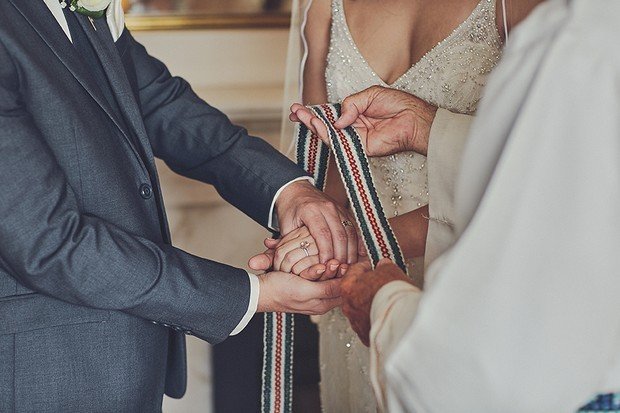
3. How long is the service?
Church weddings: It can vary depending on your service. A church wedding with mass will take anywhere between 45 minutes and 75 minutes (including signing the Register). Spiritual ceremonies are a more personalised ceremony where you can dictate its length.
Interfaith Ceremonies: Apart from the legal requirements, your ceremony will be created to include exactly what you want. Typically a ceremony would be 30-45 minutes.
HSE/Civil Ceremonies: Civil ceremonies can take approximately 15-20 minutes.
Humanist Ceremonies: According to the HAI website, ceremonies typically last 25-35 minutes. However, this can depend on the number of poems and readings you include.
Alternative/Independent Ceremonies: There is no set time limit – the couple would dictate to the celebrant their preference. Typically, most couples would choose between 20-45mins.
4. Who do I need to call to get started?
The Legal Side of Things: To give your notification of your intention to marry, you must book an appointment with your local registrar office (you can do it online here). You can find a list of Registrar Offices and telephone numbers here.
HSE/Civil Ceremony: To arrange a civil ceremony, contact the Registrar of Marriages for the district in which you intend to marry. You can find a list of Registrar Offices and telephone numbers here. For more information on organising your civil ceremony, click here.
Church Weddings: There is no specific website for church weddings as there are many different faiths. It is best to contact your local parish directly (or the parish where you intend to get married) who will be able to advise you on a church wedding ceremony and who to contact.
Interfaith Weddings: You can find our more about Interfaith Ceremonies here and will find a list of Interfaith Ministers in Ireland here.
Humanist Weddings: You can contact the Humanist Association of Ireland on 086 088 7744 or visit their website here.
Alternative/Independent Weddings: You can find a list of some Independent wedding celebrants based in Ireland here.

5. What needs to be done from a legal point of view?
Anyone getting married in Ireland whether it’s Church, Civil or Humanist ceremony must give a minimum of three months’ notice to the state of their intention to marry. To do this, you must book an appointment with your local registrar office (you can do it online here), at least three months before your wedding date. You can find a list of Registrar Offices and telephone numbers here.
You will need to bring the following documents along with you to your appointment:
- Photo ID (it must be in date). This can be a Passport, Refugee/Asylum card issued by the Department of Justice & Law Reform, or National ID card (from EU countries where they are an accepted form of travel). You will also need a colour photocopy for yourself and your partner
- Original Long Birth Certificate plus a colour photocopy for both parties
- The name and date of birth of both witnesses (they must be over 18 on the date of the ceremony)
- Proof of address in the form of a utility bill (for both parties)
- PPS Number (for both parties)
You will also need to know the following:
- Whether it is a religious, civil or secular ceremony
- The intended date and location of the ceremony
- Name of registered Solemniser/Priest (check the national list here)
- Original final divorce decree if either of you is divorced
- Death certificate and previous marriage certificate if either of you is widowed
- There is a fee of €200 for all couples (cash or card is accepted). Additional charges also apply for civil ceremonies.
At the appointment you will be asked a series of questions to establish if you’re free to marry. Once you have completed the questions and provide all the required documents, the Registrar will issue you with a Marriage Registration Form (MRF) which gives you permission to get married in Ireland. It must be signed by both of you, your witnesses and the Priest/Celebrant/Registrar at the wedding ceremony and returned to the registrar office you attended, no later than one month after the wedding so the wedding can be registered. If the marriage doesn’t take place within six months, you'll have to apply for a new MRF if you still intend to get married.
6. What do I do if I’m living abroad but am getting married in Ireland?
If you or your husband/wife-to-be is living abroad (or are unable to attend the registrar’s office in person due to serious illness), you can give your notification of intention to marry by post if arranged in advance. You need to contact the Registrar of Marriages to get approval and they will then send you on the relevant form which you must complete and return. You can find a list of Registrar Offices and telephone numbers here.
If you have been given permission to give postal notification, you and your partner will still need to make an arrangement to visit the Registrar in person at least 5 days (or less if agreed with the Registrar) before your wedding so that you can make the declaration of no impediment to the marriage and receive the Marriage Registration Form.
7. Do you have to register your notification of intention to marry in the county you intend to get married in?
No. If you’re living in Dublin but getting married in Wicklow, you can give your three months’ notification of your intention to marry in Dublin. You can find a list of Registrar Offices and telephone numbers here and you can make an appointment online here.
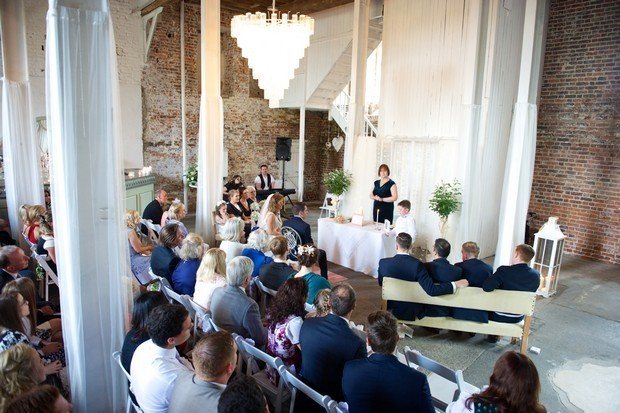
8. Are there any restrictions when it comes to Civil Ceremonies? Can you get married outdoors?
There used to be quite a few rules and regulations when it comes to where you can and can’t get married with a civil ceremony with all ceremonies taking place indoors but as of 2014, it is now okay (and legal!) to get married outdoors - however it must still meet certain criteria, full list below. If you are choosing any location other than the registry office (this is free), you will need to get approval from the HSE in advance and there will be an additional fee. You will need to contact the Registry Office for the district the venue is located in to arrange to have it approved and someone may have to go out and inspect it (a minimum of three months’ notice is required). As civil ceremonies are increasingly popular; it’s best to give yourself lots of time before your notification of intention to marry appointment so that you get the day you want (Friday’s fill up fast!), the venue approved and arrange a celebrant (civil servant).
The good news is that the majority of wedding venues such as castles, hotels etc. will have beautiful indoor rooms for the purpose of civil ceremonies (but couples will still need to apply to the HSE for approval to get married there in advance). And if the venue has a unique ceremony space such as a garden or forest setting or beautiful beach or lake backdrop, you may also be able to get approval to get married there – again, couples must apply directly to HSE/Health Services Executive Civil Registration Office for approval as the venue can’t apply on their behalf.
In the past, civil ceremonies had to take place in a fixed structure which ruled out marquees but thanks to the new legislation, that option is now available (with registrar’s approval). While many couples dream of a beach wedding, unless your venue is located on a beach, it may not be feasible to have a civil ceremony on a beach (and rules and regulations such as accessibility will still apply). However, if you are happy to have a spiritual or humanist wedding ceremony, you can indeed get married on a beach. Another limitation that still applies with civil ceremonies is that the venue must be open to the public which rules out any private dwelling like your family home.
There are no restrictions with any venues, inside or outside, for Independent/Alternative ceremonies.
As mentioned above, there are certain criteria your chosen venue must meet – see the list of requirements below:
- It must be a licensed venue and be approved by a Registrar (contact the registrar in that particular county/district to have it approved).
- They have to inspect the venue so give them plenty of notice so that it is approved in time for your wedding. There are long waits and big queues for civil ceremonies so while you have to apply at least three months in advance, it is best to get started even earlier to secure the date you want and to ensure your venue is approved on time.
- The venue must be seemly and dignified.
- The ceremony room must have adequate capacity.
- It must be a place that is open to the public (with unrestricted public access and no charge) and it must meet health and safety requirements. This means that the building must be open to the public or “is a courtyard, field or piece of ground that is open to the public and lying near to and enjoyed with the building”.
- It must have adequate public liability cover.
- It must be accessible to all including those with disabilities.
- The venue mustn’t have any connection with any religion or religious practice.
- The location must be clearly identifiable by description and location.
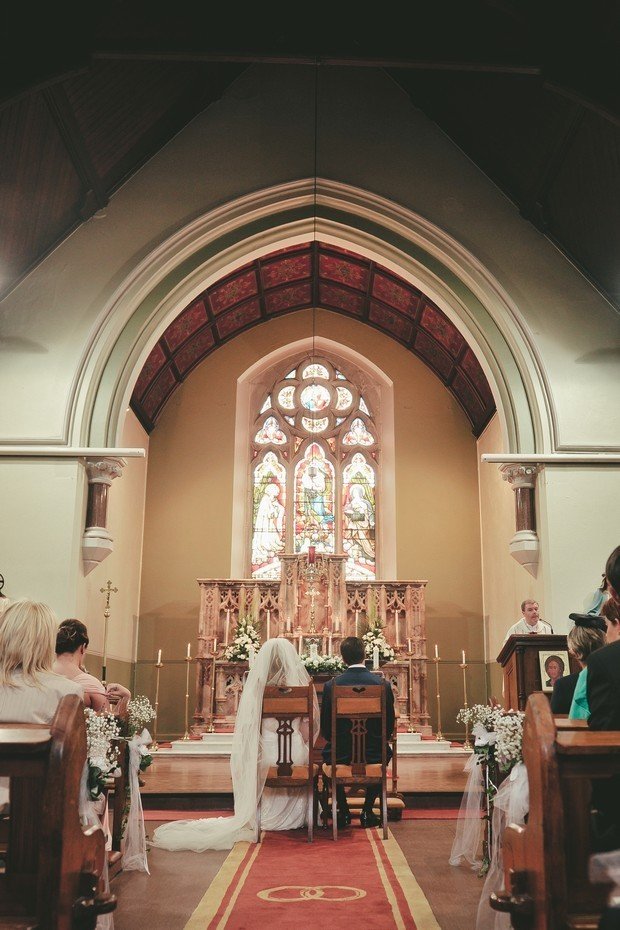
9. How can I find a priest to officiate our wedding?
For a Catholic church ceremony, you will need to make sure that you have a priest that is willing to officiate. The best way to go about this is to approach the parish you’re hoping to get married in and see if they have a priest that would be willing to officiate. If you’re getting married outside your parish, you may have to arrange your own priest. If you don’t know a priest, contact your own home parish and see if a priest is willing to travel to officiate your wedding.
There is no official website to assist you with finding a priest – our advice is to chat to family and friends if you are struggling to get a priest to marry you. They might be able to provide you with a contact that will be happy to help. You can also find a full list of Catholic churches in Ireland here which may come in handy.
10. What documents do you need for a Catholic church wedding?
There are several documents you’ll need before you can get married in a Catholic church:
1. A New Long Form of Baptismal Cert: You can get a copy of this from the church where you were baptised. It must be issued with six months of your wedding as older certificates won’t be accepted.
2. Confirmation Certificate: You’ll also need a copy of your confirmation certificate (if it’s not listed on your baptismal cert). You can get this from the church you were confirmed and again it must be issued within six months of your wedding date.
3. Proof of Freedom to Marry: The general rule is that you should have a Letter of Freedom from every parish you lived in for more than six months once you turned 18 but if you’ve changed apartments and houses regularly this can be quite a task. The purpose of the Letter of Freedom is to prove that you are in fact free to get married so if you’re having trouble finding your local parish, have a chat with the priest that is marrying you who will be able to advise you on potential ways around it. For example, in certain circumstances it may be acceptable to get a parent or long-standing relation to write a letter stating their relationship to you and that to the best of their knowledge that you’ve never been married. Another option is to swear an affidavit before a Commissioner of Oaths stating you’ve never been married.
4. Pre-Nuptial Enquiry Form: Every person (that’s both of you) getting married in a Catholic Church must have a pre-nuptial Enquiry form (see a sample here) completed by the priest from their local parish. The priest will provide you with this document. It states that you’re free to marry and that you understand the sacrament of marriage. If you’re finding it difficult to reach your parish priest, chat to the priest who is marrying you who will be able to advise you on your options and may even be happy to fill it out himself. All of your other documentation (baptism/confirmation cert, letters of freedom and pre-marriage certificate) will need to be shown to the priest at this point also.
5. Dispensation: If your partner isn’t Catholic, you will need to apply for a ‘Dispensation’ from the local Bishop. Contact your local parish priest for more information.
6. Pre-Marriage Course: Most Catholic churches will request that you attend a pre-marriage course (for example through Accord or Avalon) and obtain a certificate of completion. Check with your priest for exact requirements.
* If you have any issues or questions regarding any of these steps, it is always best to contact your local priest or parish who will be able to advise you on regulations and practices within the parish.

11. What fees may be incurred for a Catholic wedding?
There’s a lot of uncertainty around fees for a Catholic wedding. If you are getting married in a Catholic church, there is no set fee. However, some churches will require some form of payment. Typically, if you get married outside your parish, it will be more expensive. To give you an idea of what may be involved (please note, this is just an indicator – it will vary from church to church), we’ve outlined some potential costs below:
Your Parish Church: If you are getting married in your local parish, there may be no fee at all but some churches will request a donation. It varies from parish to parish but can be anything up to €250/€300.
Outside Your Parish: Typically, there is a higher fee if you are getting married outside your own parish. This can range between €300-€500.
The Priest: There is no fee for a Priest’s service but a lot of couples opt to give him a gift as a token of their thanks. A lot of couples in our forums said they were giving the priest anywhere between €150-200 euro, some as much as €250.
The Sacristan: The Sacristan is a volunteer and doesn’t get paid so again, a donation is often recommended. Most couples typically give a gift of €50.
Altar Servers: If you are having altar servers, again some couples like to give a small donation as a token of their thanks.
Pre-Marriage Course: The majority of priests will request that you complete a pre-marriage course. This can cost you between €120-200 per couple depending on the course you opt for. Avalon and Accord are two companies that offer this service.
12. How can you find out if your celebrant is legal or not?
There is a list of approved National wedding celebrants for all types of ceremonies listed on HSE’s website. If you are looking to have a legally binding ceremony, the person solemnising your marriage must be on the Register of Solemnisers. You can find it and download it here (it is under the ‘downloads’ section on the right hand side).
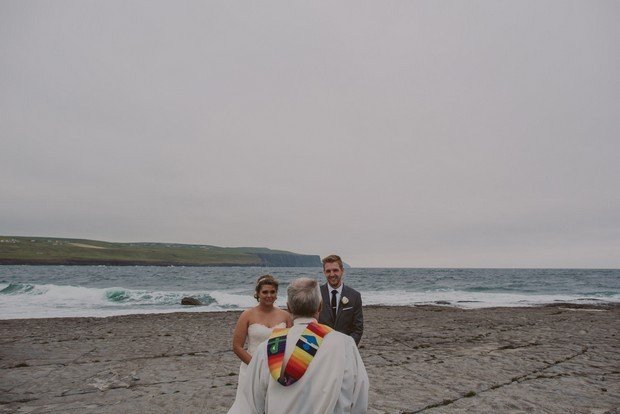
13. Can you have just the wedding service as opposed to the full mass for Catholic wedding ceremonies?
Most couples in Ireland tend to opt for the entire mass when it comes to their Catholic wedding ceremony and the church can be in favour of celebrating this sacrament of marriage within the mass if both the bride and groom are Catholic. But if you are getting married in a Catholic Church, there is an option just to have the ceremony part of the wedding and leave out the more lengthy ‘mass’ part. Some couples that come from different religious backgrounds choose this option as they feel the mass part of the wedding might alienate a lot of the guests (or the bride/groom) who are not Catholic and may feel uncomfortable as a result.
If you opt for the ceremony part of the wedding, you will still get to include readings and the Prayers of the Faithful (check out a handy list of Prayer suggestions here), the main difference is that there is no Holy Communion. This part can be problematic for couples where the bride/groom cannot receive communion as they aren’t Catholic – he/she can however receive a blessing from the Priest instead, indicated by having their arms folded before their chest and bowing their head slightly. If you are interested in having just a wedding service, have a chat with your local priest or parish to see if this is an option.
Also just to note, if your partner isn’t Catholic, you will need to apply for a ‘Dispensation’ from the local Bishop. Contact your local parish priest who will help you get this process started.
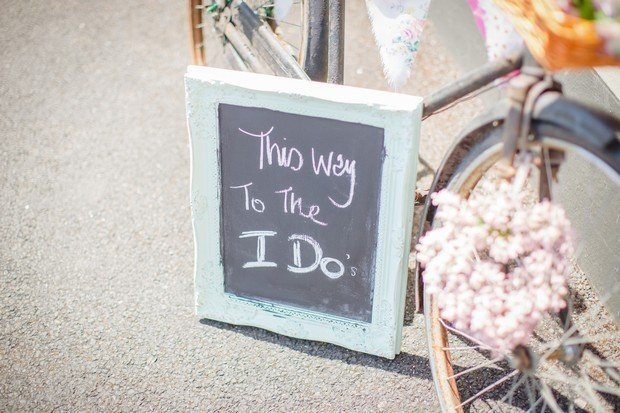
14. What ceremony options do same sex couples have?
As of May 22nd 2015 it is now legal for same sex couples to get married in Ireland. There are several ceremony options available – a humanist ceremony, a HSE/Civil ceremony and an Independent/Alternative ceremony.
If you’ve already had a civil partnership (registered in the State) and now wish to get married, a notification fee of €50 will apply on top of the notification of intention to marry fee of €200.
15. I am not an Irish national? Is there anything I need to do?
If one of you isn’t from Ireland, a Birth Certificate with an Apostille Stamp from the country of origin is required* (you can get this through the Government Department in the specific country for example UK citizens can apply here and receive it via the postal service). If you can’t get an Apostille stamp, a letter from the Embassy authenticating the certificate is acceptable as well. You will also need to have documents translated (from an independent verifiable translation company) if they’re not in English. Give yourself plenty of time as there may be delays with Bank Holidays, postage etc.
*The following countries are currently exempted from the requirement to have their birth certificates stamped or authenticated:Belgium,Denmark, Estonia, France, Italy, Latvia and Romania.
16. What do we need to do if we are both not Irish nationals?
If you’re both from abroad, there’s a bit more legwork involved on top of the other documents you will need for your notification appointment.
- You’ll need evidence of your immigration status (it must be in date).
- If English/Irish isn’t the language you use to communicate, you will need an independent interpreter in your language at your marriage notification appointment.
- You will both need to get an Apostille stamp on your birth certificates. You can find info on how to go about this above.
- If one or both of you aren’t from Ireland or the EU, both of you will need to undergo an interview process (separate to your intention to marry appointment) – allow plenty of time to arrange this.
- You will also need evidence of your civil status, i.e. that you are free to marry for example a Letter of Freedom or other documentary confirmation of your status issued by a relevant authority from your country of origin.
- Additional documents may also be requested where one or both of you are not from Ireland or the EU.
- For more information on the process, visit the HSE’s website or contact your local registrar for more information. You can find a list of Registrar Offices and telephone numbers here.
Credits:
1. Photo from Fiona & Sean's real wedding by Emma Russell Photography | 2. Photo from Miranda & Matthew's real wedding by DKPHOTO | 3. Photo from Sabrina & Ian's real wedding by Aidan Beatty Photography | 4. Photo from Kathleen & Gary's real wedding by The Fennells | 5. Photo from Luc & Jennifer's real wedding by Emma Russell Photography | 6. Photo from Tara & Gearoid's real wedding by DKPHOTO | 7. Photo from Gabriel & Kerstyn's real wedding by Aspect Photography | 8. Photo from Mairead & Neil's real wedding by McMahon Studios | Main photo: Photo from Tara & Gearoid's real wedding by DKPHOTO













